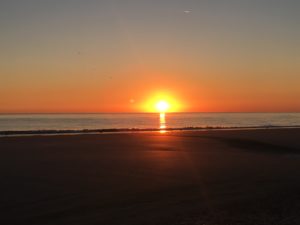 I attended a vigil with the Congregation Ahavath Chesed at their Temple in Jacksonville. It was a moving ceremony remembering the eleven people killed and several wounded at the Tree of Life Synagogue in Pittsburgh’s Squirrel Hill neighborhood, gunned down by the automatic weapons fire of a hate-filled man who said, when apprehended, that “all these Jews need to die.” This was the latest nauseating reminder of the scourge of bigotry and racism that infects our nation and the world, rearing its ugly head from the Emanuel AME Church in Charleston, SC to the Sikh gurdwara in Oak Creek, WI, to the genocides of Darfur, Bosnia and South Sudan, and hundreds of points in between. There is a darkness upon us, to be sure, and like the songwriters lamented “I’m frightened by those who don’t see it.”[1]
I attended a vigil with the Congregation Ahavath Chesed at their Temple in Jacksonville. It was a moving ceremony remembering the eleven people killed and several wounded at the Tree of Life Synagogue in Pittsburgh’s Squirrel Hill neighborhood, gunned down by the automatic weapons fire of a hate-filled man who said, when apprehended, that “all these Jews need to die.” This was the latest nauseating reminder of the scourge of bigotry and racism that infects our nation and the world, rearing its ugly head from the Emanuel AME Church in Charleston, SC to the Sikh gurdwara in Oak Creek, WI, to the genocides of Darfur, Bosnia and South Sudan, and hundreds of points in between. There is a darkness upon us, to be sure, and like the songwriters lamented “I’m frightened by those who don’t see it.”[1]
A Reason for Reflection
Many of us of differing faiths were gathered in solidarity with the Jewish community to say that such darkness is never okay, and that we grieve for those killed and wounded while merely attending their worship service. And we grieve with the rest of all communities because an attack on one group of people due to their religion or race is an attack on us all. But while we rightfully condemn such darkness, the fact is that we must examine ourselves to see if and where we are complicit. Are there hidden or possibly overt corners in our own lives where we allow darkness a foothold? Where we remain willfully ignorant or silent while others around us are bullied, harassed or treated despicably? Are we indifferent to the many forms of injustice crippling those within our reach or eyesight as we navigate around our neighborhoods and communities? Do we plant or water seeds of hatred and division in our manner of discourse, or attempts at humor, or lack of critical thinking about that which we applaud?
Light Overcomes Darkness
Jesus candidly pointed out our tendency as people to prefer darkness because we want to hide our deeds that are less than what God wants for us, and avoid being exposed (John 3:19-20). But he reminded us what we all know, whether we admit it or not: light overcomes darkness. The logic is obvious: darkness defined is “the absence of light,” so to overcome darkness one must bring light. That simple truth is illustrated in a darkened cave or room when a light is turned on. It is more profoundly demonstrated with each sunrise. And I believe it will prove true even in the darkest examples of human behavior, although it may take more time to see it.
See the Light; Be the Light
Jesus taught his followers how we are to overcome the darkness that is all around us, telling us first: “I am the light of the world. Whoever follows me will never walk in darkness, but will have the light of life” (John 8:12). He then commissions us:
You are the light of the world. A town built on a hill cannot be hidden. Neither do people light a lamp and put it under a bowl. Instead they put it on its stand, and it gives light to everyone in the house. In the same way, let your light shine before others, that they may see your good deeds and glorify your Father in heaven. (Matthew 5:14-16)
So this is the plan: see the light, then be the light. And darkness will surely fall.
[1] The Avett Brothers, “Headful of Doubt/Road Full of Promise” (I and Love and You, American 2009)
